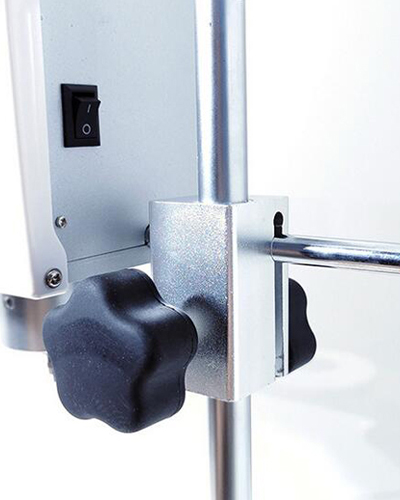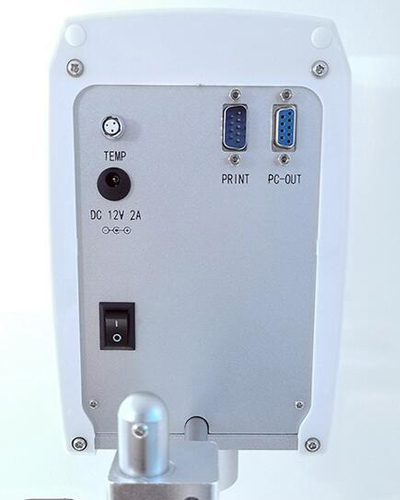Digital rotational viscometer with spindles of R2# ~ R7# and 0.3 ~ 100 rpm stepless speed, offers 100 ~ 13,000,000 mPa·s viscometer measurement. The rotary viscometer with high sensitivity, good repeatability and reliable results, is a great choice for various fluids measurement at the given range.
Features
- 5 inch colorful touch screen, simple and clear operation interface.
- Digital viscometer can display abundant information including viscosity, temperature, shear stress, shear rate, rotating speed, rotor, etc.
- With multiple functions, such as timing measuring, automatic scanning, automatic measuring range display, etc., for more accurate and reliable measurement.
- The horizontal display unit is at the front of the viscometer, convenient to adjust.
- Stepless speed regulation, 0.3~100 rpm, a total of 998 speeds.
- Optional temperature probe with measuring range of -20℃~300℃ and accuracy of 0.1℃.

All metal lifting parts
- Digital rotary viscometer has all-metal lifting parts, high stability, strong and durable. The operating knob is covered with rubber, which is comfortable and labor-saving.
- Digital rotary viscometer uses a large number of high-quality aluminum-magnesium alloy, stainless steel and other materials, and is processed by high-precision processing equipment to ensure the reliability and accuracy of the whole machine.
- The whole lifting column and rack part are made of pure copper, and cooperate with the high-precision gear components in the lifting slider to provide the host with a stable and smooth operating experience.

Rich extension interface
The digital rotational viscometer has an external power supply, wide voltage input, which can be equipped with high-precision temperature sensor, PC data acquisition software, portable printer, etc.
Applications
sisco digital rotary viscometer is widely used in the manufacturing, scientific research institutes or laboratory for viscosity measurement of oils, greases, paints, coatings, pulp, textiles, food, pharmaceuticals, adhesives and cosmetics, etc.

| Model | SISCO-RVDV-1T |
| Measuring Range | 100* ~ 13,000,000 mPa.s |
| Rotating Speed (r/min) | 0.3 ~ 100 stepless speed changes, total 998 rotating speeds available |
| Rotor | R2#, R3#, R4#, R5#, R6#, R7# |
| Sample Consumption | 500mL |
| Measuring Accuracy (Newtonian liquid) | ±1% (full range) |
| Repeatability (Newtonian liquid) | ±0.5% |
| Display | 5 inch colorful touch screen |
| Shear Stress/ Shear Rate Display | Yes |
| Timing Function | Yes |
| Viscosity Curve | Display viscosity curve in real time |
| Dynamic Viscosity | Can be displayed after inputing the sample density |
| Temperature Measuring | Standard temperature probe interface (Tempearture probe is optional) |
| Auto Scanning | Automatically scan and recommend the optimal combination of the rotor and rotating speed according to the sample viscosity. |
| Measuring Range Display | Automatically display the maximum viscosity value measurable for the selected rotor and speed combination. |
| Data Saving | 30 sets |
| Printing | Standard printing interface (Data and curve can be printed; Printer is optional) |
| Data Output Interface | RS232 |
| Power Supply | 110V/60Hz, 220V/50Hz |
| Weight | 7kg |
| Size | 300*300*450mm |
| Standard Packing List | Viscometer main machine Rotor R2# ~ R7# Rotor protective frame Triangular base and column Aluminum alloy carrying case Power adapter |
| Optional Accessories ** | Temperature probe, Rotor R1#, Software, Mini thermal printer |
Note:
* When measuring the viscosity below this lower limit, you need to choose the R1# rotor.
** For optional accessories, please contact us if you need it.
Q1: What is a viscometer?
A1: A viscometer is an instrument used to measure the viscosity of fluids (liquids and gases). Viscosity is a physical quantity that indicates the internal friction within the fluid when the fluid is flowing. It is the ability of the fluid to resist deformation. It is an important indicator used to identify some finished or semi-finished products. Viscosity varies from fluid to fluid and varies with temperature. There are mainly three types of capillary viscometers, rotational viscometers and falling ball viscometers.
Q2: What is the definition of viscosity?
A2: When a liquid is flowing, the property of internal friction between its molecules is called the viscosity of the liquid. The viscosity of the liquid is expressed by viscosity, which is a resistance factor used to characterize the properties of the liquid. The viscosity of insulating oil is the same as the viscosity of general liquid, that is, the internal friction of the liquid, that is, when the insulating oil moves relative to laminar flow under the action of external force. The properties of insulating oil molecules that generate internal frictional resistance. The greater the internal friction of the insulating oil, the greater the viscosity, the more difficult the flow, and the poorer heat dissipation performance.
Q3: What is a viscometer used for?
A3: Viscosity is an important physical parameter used to measure the ability of liquids to resist flow. Using a viscometer to measure the viscosity of a liquid is an important means of industrial process control, improving product quality, and saving and developing energy. It is closely related to the fields of petroleum, chemical, electric power, metallurgy and national defense. Status plays an important role.
Tips: What is the function of viscometer?
Viscosity is an important physical parameter that measures the resistance of liquids to flow. For example, for lubricating oil, viscosity is an important indicator for evaluating its lubricating ability. When the lubricating oil passes through the lubricated moving surface, the local high temperature and high pressure will oxidize the lubricating oil. At the same time, the addition of various impurities will also reduce the fluidity of lubricating oil, resulting in an increase in viscosity. Therefore, the measurement of lubricating oil viscosity can reflect the quality status and remaining life of lubricating oil.
Viscometer’s application field is not only in the chemical industry such as adhesives, coatings, lubricants, but also in the daily chemical industry such as toothpaste and shampoo. In addition, the viscometer is also widely used in food fields such as yogurt, honey, ketchup, fruit juice and beverages. In the production process, a viscometer is often used to detect the viscosity of the product, so as to control the viscosity of the product. Viscometers are indispensable tools in production and product development. SISCO digital rotational viscometer is stable and reliable in quality, high in accuracy and good in repeatability. With the help of a viscometer, the product can be controlled within the appropriate viscosity range to give full play to its performance.
Thank you for buying industrial test and measurement equipment on SISCO.com, all products sold by SISCO and the partner cover a 12 months warranty, effective from the date of receiving the products.
What is covered?
SISCO is responsible for providing free spare parts, and free technical support to assist the customer to repair the defective products until the problem is solved.
What is not covered?
- Product purchased from anyone other than a SISCO store or a SISCO authorized reseller.
- Expendable parts.
- Routine cleaning or normal cosmetic and mechanical wear.
- Damage from misuse, abuse or neglect.
- Damage from use of parts other than SISCO approved.
- Damage from use outside the product’s usage or storage parameters.
- Damage from use of parts not sold by SISCO.
- Damage from modification or incorporation into other products.
- Damage from repair or replacement of warranted parts by a service provider other than a SISCO authorized service provider.
- Damage caused by the application environment not meeting the product usage requirements and the failure to perform preventive maintenance.

